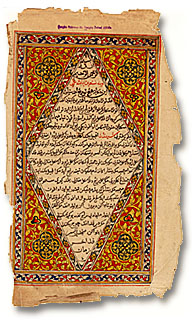To
the orang asli, the "original people" who have
for millenia inhabited the forests of Malaysia, the earth
was
an abode for more than the diversity of plant and
animal life. The world's oldest jungles, dense
with mystery, were the playground of spirits,
both benevolent and, well, less so. Prominent natural features--and there are many
in Malaysia--were wreathed in legend. Tioman Island is said to
have been a dragon princess who decided to make
her home where Tioman now rises out of the sea.
Tranquil Lake Chini
in the wilds of Pahang is thought to be the site
of a magnificent Khmer city now sunk beneath the
lotus blossoms. Mount Ophir,
in Johor, is said to be the home of 'Puteri
Gunung Ledang', a legendary princess once wooed
by the Sultan of Malacca. The princess' beauty is
still associated with the natural charms of the
mountain itself. Langkawi
Island has no such creation story, but the
curse laid on the island by a princess falsely
accused of adultery is one of the best-known of
Malaysia's magical myths.
The supernatural imbues not only the land and
water, but living things as well. The orang asli
believe that one's semangat--soul or life
force--traveled abroad during sleep; dreams were
the record of the soul's adventures. In the city,
it is a little harder to find someone who
believes so wholeheartedly in what was once a
compelling way of thought. But fragments of the
old mythological system remain; the kris--the
wavy-bladed Malay dagger--is a shining example.
Many Malays have their own kris as well as their
own kris tales. The kris is reputed to be able to
fly by night and seek out victims (their owners'
enemies, presumably) without a guiding hand. One
who possessed a loyal kris was indeed powerful.
|
|

"The
kris is reputed to be able to fly by night and seek out
victims (their owners' enemies, presumably)
without a guiding hand. One who possessed a loyal
kris was indeed powerful." 
The manuscript
above relates the story of Hang Tuah,
the most revered warrior of the Malaccan
Sultanate. The Sultan Tun Perak ordered Tuah to
be executed after he offended the sultan, but a
loyal bendahara (royal advisor)
secretly imprisoned him instead. Courtiers later
discovered Tuah's best friend, Hang Kasturi,
romancing one of the sultan's concubines, and
surrounded the palace - but no one dared go in to
capture Kasturi. When the sultan was told that
Tuah was still alive, he ordered Tuah to kill his
best friend to prove his loyalty. During the
fight, Tuah embedded his kris in the palace wall
three times, but Kasturi allowed him to remove
it. But when the same thing happened to Kasturi,
Tuah stabbed him in the back."Does a man who
is a man go back on his word like that,"
asked a dying Kasturi. "Who need play fair
with you, you who have been guilty of
treason," Tuah replied. The sultan rewarded
him with the title laksamana, or
admiral.
|
|